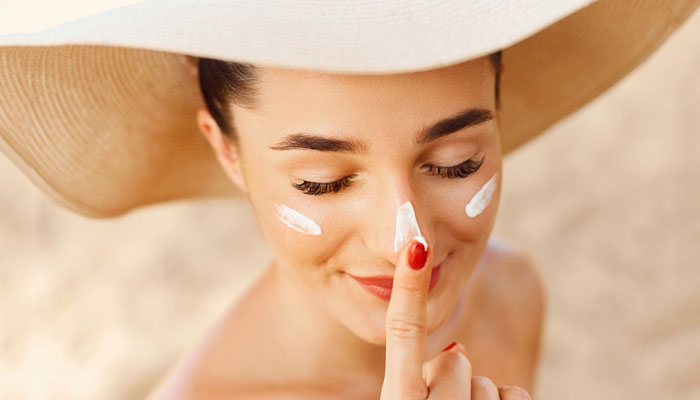
Many people find it difficult to get clear skin. The methods for getting clear skin will vary, depending on the person’s skin type. In general, people struggling with acne or blemishes have skin that is dry, oily, or a combination of the two.
Numerous skin care tips exist for different skin types, and there are also general tips that people can try. Anyone uncertain about their skin care routine should consult a dermatologist for additional advice.
Wearing sunscreen can help protect oily skin from sunlight.
People may wish to try these general tips for getting clear skin fast.
A pimple indicates trapped oil, sebum, and bacteria. It is also a sign that the body’s natural healing mechanism is working.
Popping the pimple disrupts this healing process. Additionally, the released liquids expose the surrounding skin to similar bacteria, increasing the risk of additional pimples forming.
The exposed pimple may also lead to permanent scarring. Whenever possible, avoid popping pimples. If they drain, keep the area clean.
The American Academy of Dermatology recommend that people wash twice daily and then again after sweating. Leaving sweat on the skin and allowing it to dry can make acne worse, so it is best to wash the skin as soon as possible after sweating.
Touching the face with the hands can deposit dirt, oils, and bacteria onto the skin and lead to breakouts.
All skin types can benefit from moisturizing after a daily face wash. Keeping the face moisturized may help control sebum production and prevent damage from the outside elements.
The most effective moisturizer will vary in each case, depending on the person’s skin type. Anyone uncertain of what moisturizers will work for them should contact a dermatologist.
The sun’s ultraviolet (UV) rays damage the skin. Wearing sunscreen whenever outdoors can help protect the skin from these harmful rays.
People who need extra care for their skin will generally find that they react better to gentle products, which are less likely to irritate the skin. Products that commonly irritate sensitive skin include:
alcohol-based products
toners
exfoliants
astringents
Gentle, hypoallergenic versions of these products do exist. However, it is still important to test a small area of skin for reactions before applying any product to a more extensive area.
Showering, bathing, or washing the hands and face with very hot water can dry out or damage the skin. People who notice dry skin after bathing can try using lukewarm water instead.
Exfoliation is important to help wash away dead skin cells, but some devices can be too abrasive and may actually harm the skin. Tools such as washcloths, rough sponges, or loofahs may be too rough for the skin, causing damage and irritation.
Some delicate options exist, such as soft cleansing brushes. Alternatively, using clean fingers to massage a cleanser into the face may help prevent extra irritation.
Topical medications may help people of all skin types control acne. Several different medicated products are available, including:
benzoyl peroxide, with or without other ingredients, such as antibiotics
salicylic acid
topical retinoids, such as tretinoin
dapsone, which is a combination anti-inflammatory and antibiotic
azelaic acid to unclog pores
All cells in the body need water. The skin cells are closest to the environment and, therefore, may be more at risk of losing their moisture to the elements. Drinking water throughout the day may help keep the skin cells healthy.
Eating a healthful diet rich in nutrients is important for the body as a whole, and it may also benefit the skin. Eating a diet rich in various plant foods and lean protein sources may help provide the nutrients that the skin needs to stay healthy.
People looking to keep their skin clear may also want to cut out specific troublesome foods, such as dairy milk. A review in Clinical Nutrition found a positive relationship between milk and acne. Some believe that this link is due to the growth compounds and hormones that the milk contains.
However, everyone may have different trigger foods that make their symptoms worse.
While gentle, natural products can help manage the skin and may help with minor breakouts, people with persistent or severe acne should see a dermatologist to discuss medicated options. Medicated options will vary depending on skin type and acne severity.
Sometimes, makeup products can aggravate breakouts. Switching to natural makeup products or those designed to let the pores breathe may help reduce breakouts from makeup.
It is also important to remove all makeup each night and clean any makeup brushes or tools regularly.
Although the evidence is largely anecdotal, some lifestyle changes may also help keep the skin balanced. Lifestyle changes to consider include:
getting a full night’s rest each night
avoiding smoking
reducing or eliminating excess sugar
avoiding fried foods
It is also important to minimize stress whenever possible. The authors of a 2017 article noted that acne vulgaris is one of the most common inflammatory skin disorders.
They also highlight the link between stress and acne, stating that stress can increase inflammatory compounds in the body. Strong feelings of anger or emotional stress may lead to an acne breakout or make symptoms worse.
Due to this, it is important to find ways of reducing stress to help control acne. Stress management techniques include:
exercising regularly
getting massages or acupuncture
engaging in calming practices, such as meditation or breathing exercises
doing movement activities, including yoga and tai chi
Stress-reducing activities will also vary from person to person. Some people may enjoy going for a walk in the woods while others might prefer writing in a journal, for example.
People with oily skin may be more prone to acne and breakouts. Oily skin creates too much sebum and may have a shiny look to it. Some general tips for oily skin include:
Use an oil-free cleanser
People with oily skin can look for a natural, oil-free cleanser that helps break down and wash away excess sebum without adding even more oil to the skin. A number of mild cleansers are available specifically for acne-prone skin.
Wash the hair daily
People with oily skin may also have an oily scalp. This excess oil can move to the face and encourage breakouts. Washing the hair each day may help control oil and reduce breakouts.
Use toner
People with oily skin who are prone to acne may benefit from using a gentle toner to help unclog the pores. Products containing ingredients such as salicylic acid or glycolic acid may help balance the skin’s pH and keep the pores clear.
Always wear sunscreen
Oily skin may also be more reactive to sunlight. Wearing sunscreen during any exposure to sunlight may help reduce this reaction. However, it is important to find sunscreens without oil or other ingredients that will contribute to more clogged pores.
Learn more about remedies and tips for oily skin here.
People with combination skin have to care for dry patches of skin in addition to more oily areas, such as the T-zone, which is an oily zone that runs above the eyebrows and down the nose to the chin, making a T shape.
Consider using two facial cleansers
Facial cleansing can be tricky for people with combination skin. While some may respond well to a facial cleanser designed for oily skin, others may find that this dries out some patches of skin too much.
People with troublesome combination skin may find that using a general mild cleanser on the face and then an oil-reducing cleanser on any oily areas helps balance the skin.
Use blotting papers
Using blotting papers for oily spots may help temporarily balance combination skin and make it easier to manage. It may also help prevent sebum overproduction leading to acne breakouts in these areas.
Dry skin produces less oil naturally, which can reduce the skin’s vitality.
People with dry skin may still struggle with acne, which may appear if they use an unsuitable moisturizer or add too much oil to their face to counteract their skin’s natural state.
Find a gentle moisturizer
Moisture is essential for dry skin, but it is important to find a source of moisture that does not clog the pores. Some people may find that their skin responds well to natural oils, such as argan oil, olive oil, or coconut oil.
Use gentle washes
Finding a gentle wash that does not strip the skin of natural oils is especially important for people with dry skin. It may be best for an individual to work with a dermatologist to find the best gentle cleanser for their skin.
Summary
People can try a variety of techniques for attaining clear skin at home.
The best methods will depend on the person’s skin type.
However, general lifestyle changes, such as reducing stress, staying hydrated, and eating a healthful diet, can be effective for many people.









